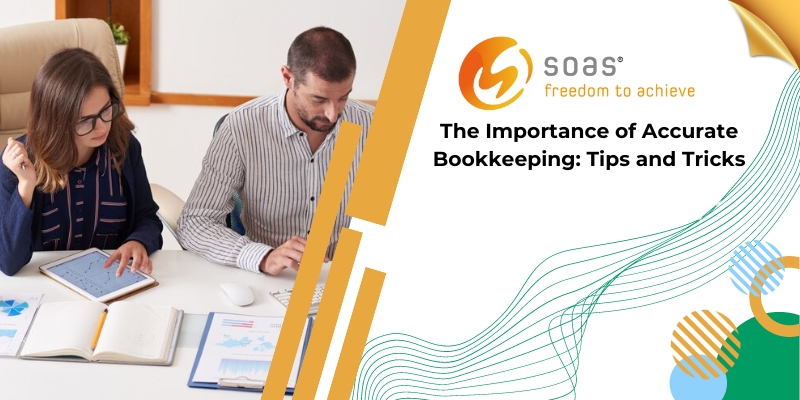The Importance of Accurate Bookkeeping: Tips and Tricks

Bookkeeping, often perceived as a mundane task, is the backbone of any successful business. Accurate bookkeeping not only ensures compliance with legal requirements but also provides crucial insights into a company’s financial health. Let’s delve into why accurate bookkeeping is essential and explore some practical tips and tricks to maintain meticulous records.
Why Accurate Bookkeeping Matters
1. Financial Health Monitoring
Accurate bookkeeping is essential for monitoring the financial health of a business. By keeping a detailed and up-to-date record of all financial transactions, businesses can gain a comprehensive understanding of their cash flow, expenses, and revenue. This clear financial picture allows business owners to make informed decisions, identify trends, and plan strategically for the future. Whether it’s determining the best time to expand, cut costs, or invest in new opportunities, precise financial data is invaluable for steering the business towards success.
2. Legal Compliance
Maintaining accurate financial records is a legal requirement for businesses. Proper bookkeeping ensures that all transactions are recorded and reported correctly, which is crucial for compliance with tax laws and regulations. Failure to keep accurate records can result in penalties, fines, and even legal action. By adhering to legal requirements through meticulous bookkeeping, businesses can avoid these risks and operate with confidence, knowing that their financial practices are transparent and compliant.
3. Tax Preparation
When it comes to tax preparation, accurate bookkeeping is a lifesaver. Having well-organized financial records makes it easier to file accurate tax returns and claim all eligible deductions. This not only saves time and reduces stress during tax season but also minimizes the risk of errors that could trigger audits or result in overpaying taxes. By keeping detailed records throughout the year, businesses can ensure they are fully prepared when it’s time to meet their tax obligations.
4. Fraud Prevention
Regular and precise bookkeeping can serve as an effective deterrent against fraud. By maintaining detailed records and regularly reviewing financial transactions, businesses can quickly spot any irregularities or discrepancies. This vigilance helps to identify and address potential fraud before it can cause significant damage. Implementing strong internal controls and regularly auditing financial records further enhances the ability to prevent fraudulent activities and protect the business’s financial integrity.
5. Improved Cash Flow Management
Effective cash flow management is critical for the survival and growth of any business. Accurate bookkeeping allows businesses to track their receivables and payables efficiently, ensuring that they have a clear understanding of their cash flow situation. This enables businesses to plan for upcoming expenses, avoid cash shortages, and ensure that they always have enough funds to meet their obligations. By staying on top of cash flow through meticulous record-keeping, businesses can maintain financial stability and avoid costly surprises.
Tips and Tricks for Accurate Bookkeeping
1. Stay Consistent
Consistency is key when it comes to bookkeeping. Establishing a routine for recording transactions—whether daily, weekly, or monthly—helps prevent the backlog of unrecorded transactions and reduces the likelihood of errors. Consistent record-keeping ensures that financial data is always up-to-date, providing an accurate reflection of the business’s financial health at any given time.
2. Use Accounting Software
Leveraging accounting software can significantly simplify and streamline the bookkeeping process. Tools like Automa8e offer automated features for recording transactions, generating financial reports, and reconciling accounts. These software solutions not only save time but also reduce the risk of human error, ensuring that financial records are accurate and easily accessible.
3. Keep Personal and Business Finances Separate
Mixing personal and business finances can lead to confusion and inaccurate records. To maintain clarity, always keep separate bank accounts and credit cards for business transactions. This separation makes it easier to track business expenses, prepare financial statements, and comply with tax requirements. It also helps protect personal assets from business liabilities.
4. Reconcile Accounts Regularly
Regularly reconciling your bank statements with your bookkeeping records is crucial for ensuring accuracy. This process involves comparing the transactions recorded in your books with those shown on your bank statements to identify any discrepancies. Regular reconciliation helps catch errors, detect fraudulent activity, and ensure that all transactions have been accurately recorded.
5. Maintain Backup Copies
Maintaining backup copies of your financial records is essential for safeguarding your data. Use cloud storage solutions or external hard drives to store backups, ensuring that you can recover your records in case of system failures, data loss, or other unforeseen events. Regularly updating these backups provides an extra layer of protection for your financial information.
6. Hire a Professional
If bookkeeping seems overwhelming or if your business’s financial transactions are complex, consider hiring a professional bookkeeper or accountant. These experts can provide valuable advice, ensure the accuracy of your records, and help manage your finances effectively. By outsourcing bookkeeping tasks, business owners can focus on other critical aspects of their operations.
7. Stay Updated with Financial Regulations
Financial regulations and tax laws are constantly evolving. Staying informed about the latest changes is crucial for maintaining compliance and avoiding legal issues. Regularly reviewing updates from relevant authorities and consulting with financial professionals can help ensure that your bookkeeping practices align with current standards.
FAQs about Bookkeeping
Q1: What is the difference between bookkeeping and accounting?
Q2: How often should I update my books?
A: Ideally, you should update your books daily or at least weekly. Regular updates prevent backlog and ensure that your financial data is current and accurate.
